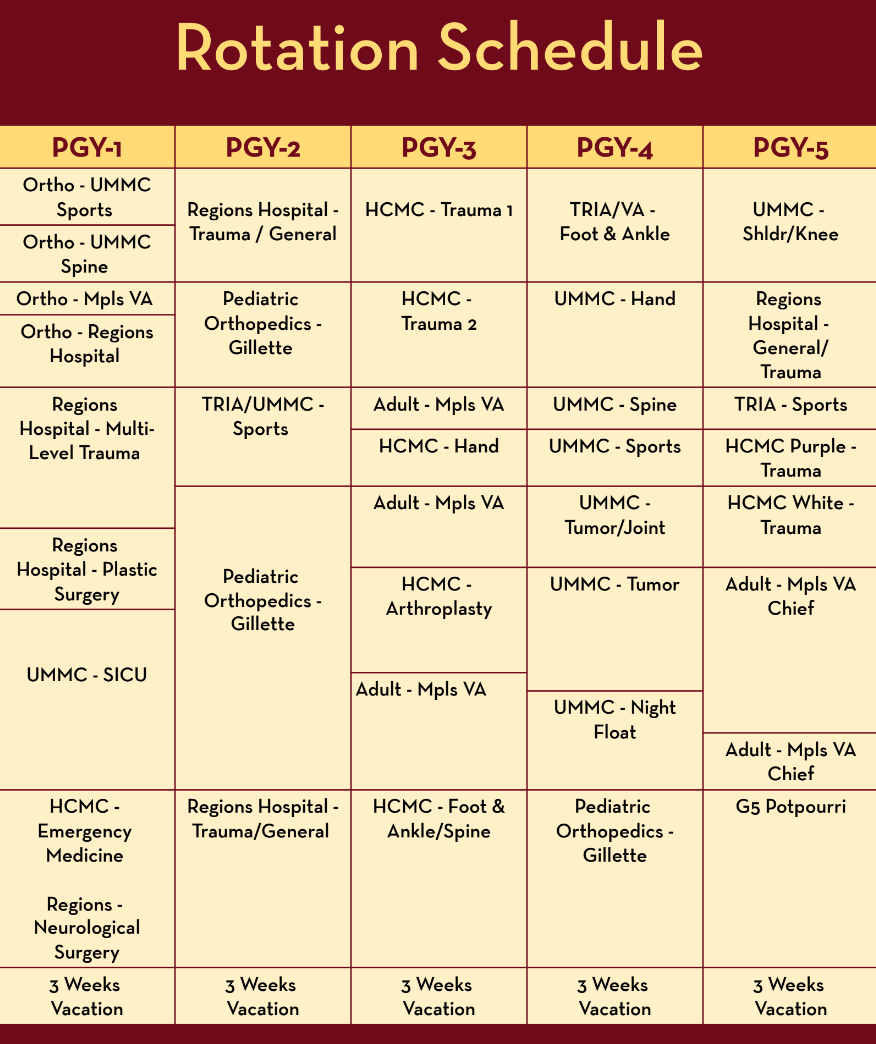Curriculum Overview
PGY-1
The PGY-1 year includes six months of structured education on non-orthopedic rotations, including surgery, emergency medicine, surgical intensive care, neurological surgery, anesthesiology, and six months of orthopedics.
PGY-2 & PGY-3
Rotations during the PGY-2 and PGY-3 years provide a comprehensive background working with faculty to provide a solid base in general orthopedics, adult reconstruction, pediatric orthopedics, traumatology, and exposure to sports medicine.
PGY-4
During the PGY-4 year, specialty rotations in foot and ankle, hand, joints, musculoskeletal tumors, spine, and sports are the focus of the curriculum. Residents also revisit pediatrics with an emphasis on trauma.
PGY-5
The PGY-5 year completes the program and is spent completing chief rotations at the Veterans Affairs Medical Center, Hennepin County Medical Center, and Regions Hospital, as well as additional experience in sports medicine and career development.
Rotation Schedule

PGY-1 Skills Week
Each of our main clinical sites sponsor a day of instruction with hands-on practice in foundational orthopedic skills. Highlights include simulated wire navigation, fracture reduction with external fixator placement, and microsuturing skills.
TRIA Orthopedic Center Anatomy Lab
PGY-2 Residents participate in eight gross anatomy dissection labs at TRIA Orthopedic Center under the guidance of faculty and chief residents.
Gillette Children's Specialty Healthcare Simulation Series
PGY-2 Residents acquire essential pediatric surgical skills through the Gillette simulation series. The curriculum includes lectures and simulations in supracondylar fracture management, pelvic osteotomy, and Ponseti casting.
Arthroplasty Skills Lab
PGY-2 through PGY-5 residents participate in knee and shoulder arthroscopy skills at TRIA Orthopedic Center. Residents learn fundamental and advanced shoulder and knee procedures through an adaptive curriculum.
Hand Skills Lab
All residents participate in an annual hand skills lab. PGY-3, 4, and 5 residents complete competency testing in carpal tunnel and trigger finger release procedures using cadaveric specimens.
Arthroscopy Cadaveric Labs
During rotations at the Minneapolis Veterans Affairs Medical Center, residents participate in total hip, total knee, and total ankle arthroplasty cadaveric labs. PGY-2 residents are assigned to specific anatomic areas with a chief resident as mentor and faculty members as proctors. Faculty advise the chief residents regarding the development of the dissection guides and will attend the anatomy lab sessions, which are mandatory for all PGY-2 residents and the mentoring chief residents. All residents are invited to participate in these sessions.
There are eight gross anatomy dissection sessions, consisting of:
-
Cervical spine, anterior and posterior
-
Thoracic spine, anterior and posterior
-
Elbow and forearm, hand and wrist
-
Scapula and shoulder, brachial plexus
-
Hip and thigh
-
Pelvis and acetabulum, lumbosacral plexus
-
Thigh and knee
-
Leg, foot and ankle
Simulations
Simulations provide residents with experience that supplements clinical care. The department uses a number of simulations to effectively train residents: